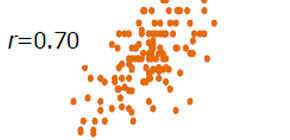
Method for predicting cognitive and social functions in schizophrenia patients developed
A tool to support rehabilitation
Schizophrenia is a mental disorder which occurs in approximately one in every 100 people. Its main symptoms include positive symptoms such as hallucination and delusion, and negative symptoms such as lowering of motivation, apathia, and cognitive disorders, as core symptoms for the disorder. In many cases, this disorder becomes chronic and relapses.
Cognitive disorders, in particular, often remain after mental symptoms become less severe, making it harder for patients to live independently and rejoin society. That’s why precise assessment of cognitive function in patients with schizophrenia is important in supporting their readjustment to society. However, easy-to-use cognition function assessment methods that take into consideration the relationship between treatment hours and functional outcomes have not been developed.
A group of researchers led by Associate Professor HASHIMOTO Ryota at the United Graduate School of Child Development and Professor SUMIYOSHI Chika at the Faculty of Human Development and Culture, Fukushima University, developed an easy-to-use method (a simplified version of currently used tests) for predicting cognitive function and functional outcomes (improved life skills and social functioning) in patients with schizophrenia. Specifically, this group found the best combination of inspection items that were strongly related to life skills and social skills and helpful for predicting the whole cognitive function from a battery of general intelligence tests.
This simplified version of the test: 1) can evaluate the whole cognitive function in patients with schizophrenia in a short period of time (about 10 minutes), 2) can predict life skills and social functioning status of patients, and 3) will make it possible to assess cognitive function in multiple facilities throughout Japan based on unified criteria.
Human intelligence is thought to be an integration of a wide range of cognitive functions. For evaluating cognitive functions, a simplified version of a battery of general-purpose intelligent tests, which were composed of reduced inspection items, was often used, but it was not intended for patients with schizophrenia.
The use of the simplified version proposed by this group will make it possible to get useful information about the possibility for patients to return to society by predicting their general cognitive function and functional outcomes. Furthermore, the evaluation of cognitive function based on unified criteria at multiple facilities in Japan will become possible, which will promote a return to society for patients with schizophrenia on a nationwide scale.
This simplified version will also make it possible to assess intelligence and cognitive function, which form the foundation of life skills and social skills, with high accuracy, and will make it possible to predict a higher level of outcome, or the return to society and daily life. Presentation of information about returning to society will motivate patients to receive treatment, promote their compliance with medication, and greatly contribute to the improvement of quality of life for patients and their families.
This study is performed by the Cognitive Genetics Collaborative Research Organization (COCORO) and gives unified assessment criteria in Japan. It is hoped that this organization will provide information that is helpful for patients with schizophrenia to return to society through several approaches including the presentation of the distribution of cognitive function in those patients based on big data on patients in multiple facilities in Japan.
Abstract
The Wechsler Adult Intelligence Scale (WAIS) has been widely used to assess intellectual functioning not only in healthy adults but also people with psychiatric disorders. The purpose of the study was to develop an optimal WAIS-3 short form (SF) to evaluate intellectual status in patients with schizophrenia. One hundred and fifty patients with schizophrenia and 221 healthy controls entered the study. To select subtests for SFs, following criteria were considered: 1) predictability for the full IQ (FIQ), 2) representativeness for the IQ structure, 3) consistency of subtests across versions, 4) sensitivity to functional outcome measures, 5) conciseness in administration time. First, exploratory factor analysis (EFA) and multiple regression analysis were conducted to select subtests satisfying the first and the second criteria. Then, candidate SFs were nominated based on the third criterion and the coverage of verbal IQ and performance IQ. Finally, the optimality of candidate SFs was evaluated in terms of the fourth and fifth criteria. The results suggest that the dyad of Similarities and Symbol Search was the most optimal satisfying the above criteria.
Figure 1
Figure 2
Figure 3
Figure 4
To learn more about this research, please view the full research report entitled “ Usefulness of the Wechsler Intelligence Scale short form for assessing functional outcomes in patients with schizophrenia ” at this page of the Psychiatry Research website.
Related link
- Department of Psychiatry, Graduate School of Medicine, Osaka University (link in Japanese)
